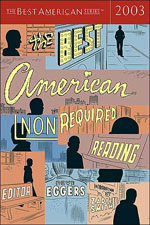[Transcribed discussion of “The Loop,” by J. Malcolm Garcia, published in The Virginia Quarterly Review.
In this article, the author visits Jena, Louisiana. In September 2006, nooses were hung from a tree in the high-school courtyard in this small town. A few weeks after the nooses were hung, a black student was assaulted by white kids at a party. The white kids were let off without charges. A few weeks after that, six black kids beat up a white kid. The white student came away with a few bruises and a black eye. Nonetheless, the six were charged as adults with attempted second-degree murder. Their bonds were set between $70,000 and $138,000. A racially charged crisis exploded. Lawmakers, reporters, and protestors descended on the town. J. Malcolm Garcia’s report, however, is unique for its approach. Garcia interviewed people holding many different positions, including neo-Nazis advocating a race war, and then spliced together the multiple viewpoints.]
Eli: I loved this piece. I was worried it was going to be a standard, newsy article. I wasn’t sure how he was going to handle it. But the way he breaks it up is amazing. The different viewpoints offer such an excellent cross-section of the reality there. It educated me. It scared me. And he portrays people—like those guys who want a race war—without tainting the writing with his own personal biases. It didn’t feel preachy. That’s hard to pull off.
Bora: I loved it, too. But I disagree about the biases. I think he put his own opinions into it. But in a good way. He definitely wanted to say, “Look, racism is bad and still very much a problem.” He put that in so subtly, though, that you hardly notice. But it’s there.
Yael: It’s the kind of thing where if you found it in a textbook you would think it was biased. But that doesn’t matter. Textbooks are boring. As journalism, this is incredible. The writing is so good. It’s only biased the way good fiction is biased.
Will: I agree.
Bora: Right, it’s not preachy so it doesn’t feel like an unfair bias. The key is that he doesn’t ever come across as preachy.
[The students were asked why the article is called “The Loop.” The author explains that the loop is a circular route local youngsters use to cruise through town late at night.]
Tanea: He’s making a comment about the cycle of history. Whether it’s ‘64 or ’04, it’s the same town. The same racism is still there and alive.
Will: That really amazed me. At first, when I was reading, I thought this couldn’t be 2008. I actually hadn’t heard about any of this, about the Jena Six. So I thought it was something from twenty years ago. But this is modern-day. That blew me away.
[The students were asked how prominent racism is in their school environments.]
Bora: It’s a lot subtler now. I don’t want to say I’ve felt the kind of racism these kids in Jena felt. I don’t want to detract from that at all. But there is this kind of accidental racism around here that’s pretty common. Like there was once this community service project I was a part of and the teacher asked for someone who spoke Mandarin. And he looked over at me and asked if I spoke Mandarin. And I said, “Uh, no. I’m not Chinese.” He just assumed I was. That kind of thing happens a lot. But it’s not malicious. It’s by accident.
Eli: Racism now is less aggressive in general. In Jena it was pretty aggressive, I guess. But I don’t think it’s as strong in a certain way because there aren’t things like Jim Crow laws to keep it officially in practice. But it’s still there. Come to think of it, maybe it’s worse in a sense because it’s under the surface just waiting to erupt.
Subscribe to:
Post Comments (Atom)









No comments:
Post a Comment